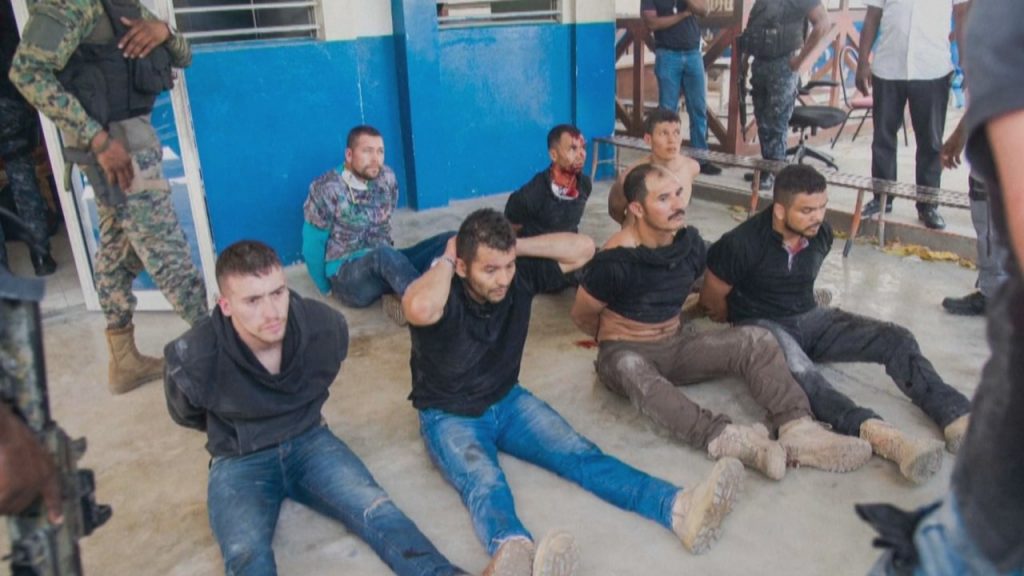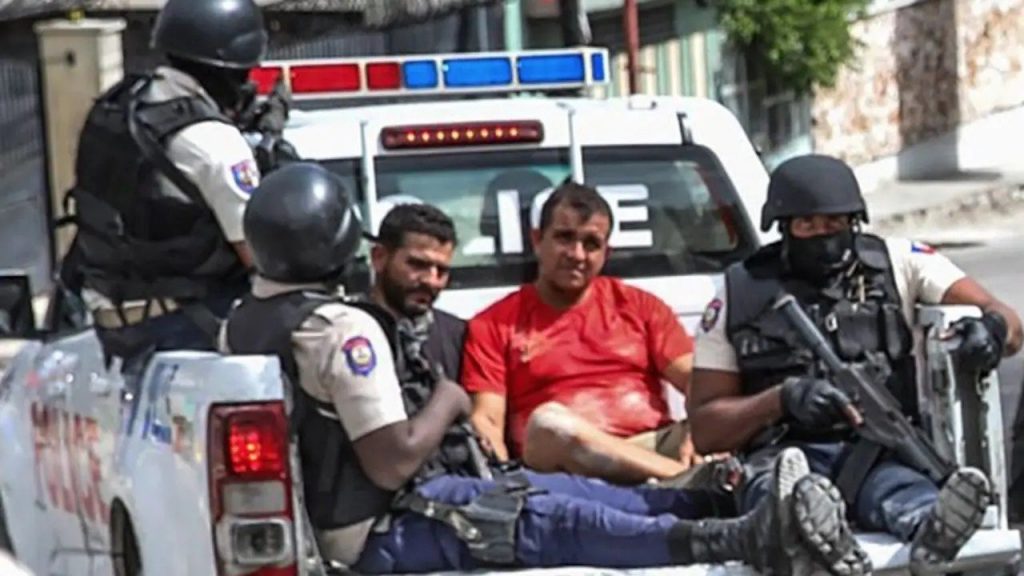Haitian police have arrested suspects in the killing of President Moise including men who appeared to be former Colombian soldiers.
A 28-member hit squad made up of Americans and Colombians assassinated President Jovenel Moise, Haitian police said Thursday, adding that eight were still at large as the country lurched into political chaos.
One day after Moise was killed and his wife Martine wounded by gunmen in their Port-au-Prince home, the poorest country in the Americas has no president or working parliament and two men claiming to be in charge as prime minister.
Police paraded some of the suspects before the media on Thursday, along with Colombian passports and weapons they had seized. The head of the Haiti’s National Police, Leon Charles, vowed to track the other eight down.
“It was a team of 28 assailants, 26 of whom were Colombian, who carried out the operation to assassinate the president,” Charles said at the press conference in Port-au-Prince.
“We have arrested 15 Colombians and the two Americans of Haitian origin. Three Colombians have been killed while eight others are on the loose.”

Previously authorities had said four of the suspects had been killed. Charles did not explain the discrepancy.
Colombia’s defense minister Diego Molano also said at least six members of the hit squad appeared to be Colombian ex-soldiers, and that he had ordered the army and police to help with the investigation.
“The initial information indicates that they are Colombian citizens, retired members of the national army,” Molano said in a video sent to news media.
Hundreds of residents clamored outside a police station in the capital, Port-au-Prince, where suspects were being held, shouting “burn them” and setting fire to a vehicle they presumed was that of the assassins.
Police chief Charles described the killers as “mercenaries” and said that security forces had engaged in a fierce gun battle with the suspected assassins that lasted late into the night.
“We have the physical authors, now we are looking for the intellectual authors,” Charles said.
One of the men arrested is a Haitian-American US citizen named James Solages, Haiti’s minister of elections told the Associated Press. The US State Department could not confirm if a US citizen was among those arrested.
As the unrest continues, Haiti is observing two weeks of mourning for the death of Moise.
Moise, 53, was killed at his private home in the early morning hours of July 7 by what appears to be a group of highly trained killers, opening up a political vacuum just as Moise and other civil leaders were preparing for elections and discussing revisions to Haiti’s constitution.
Moise, elected in 2016 with less than 600,000 votes out of a potential 6.1 million, was sworn in as president in 2017.
Opposition parties had said Moise’s term should have ended in February, five years after his predecessor stepped down, and say he was trying to hold on to power by decree. Moise had contended his term extended until 2022.
A nation of 11 million, Haiti is the poorest country in the Americas with 4 million people living in hunger, widespread gang violence and armed groups controlling broad areas of the country including many neighbourhoods in Haiti’s capital. It faces a COVID epidemic and has been racked with political instability.
Moise on July 5 appointed a replacement prime minister for Joseph, Ariel Henry, who had been forming a new government at the time of the assassination. Henry had not been sworn in and challenges Joseph’s legitimacy.
According to Haiti’s constitution, Moise should be replaced by the president of Haiti’s Supreme Court, but the chief justice died in recent days from COVID-19, leaving open the question of who might rightfully succeed to the office.
The UN Special Envoy for Haiti said Thursday Prime Minister Joseph would remain the leader of the Caribbean nation until an election is held as she urged all parties to set aside their differences following the assassination of Moise.
“Stakeholders need to set aside their differences and to chart a common way forward and overcome this difficult moment in a peaceful manner,” UN Haiti envoy Helen La Lime said in a virtual media briefing from New York.

Joseph assured La Lime the elections were on track to be held on September 26 with a second-round in November this year, she said.
La Lime said a Security Council discussion Thursday centered on a request by Haiti for additional security assistance.
A UN peacekeeping mission began in 2004, after a rebellion toppled then-President Jean-Bertrand Aristide, ended in 2019 with the country still in disarray.
The prime minister is moving to “assure the continuity of the state” amid a “political vacuum” following Moise’s assassination, Haiti Ambassador to the US Bocchit Edmond told the MSNBC news outlet on Thursday.
Edmond said Haiti is asking the US to help in the investigation and to help provide security. The US State Department said it was responding to a request for investigative assistance.
Haiti First Lady Martine Moise was injured in the attack and was transported by air to a US hospital in Florida for medical care.
Haiti’s land border with neighboring Dominican Republic and airport at Port-au-Prince remained closed on Thursday amid a nationwide state of emergency declared by Joseph.
Public transport and street vendors were scarce, an unusual sight for the normally bustling streets of Port-au-Prince.
Marco Destin, 39, was walking to see his family since no buses, known as tap-taps, were available. He was carrying a loaf of bread for them because they had not left their house since the president’s killing out of fear for their lives.
“Everyone at home is sleeping with one eye open and one eye closed,” he said. “If the head of state is not protected, I don’t have any protection whatsoever.”
Destin said Haiti has always been a complicated country and that he was not sure what the upcoming days would bring. “Haiti doesn’t know what direction it’s heading in right now,” he said. “To be honest, I don’t know what the solution is. There’s always been a fight for power.”
 Alghadeer TV Alghadeer TV
Alghadeer TV Alghadeer TV
